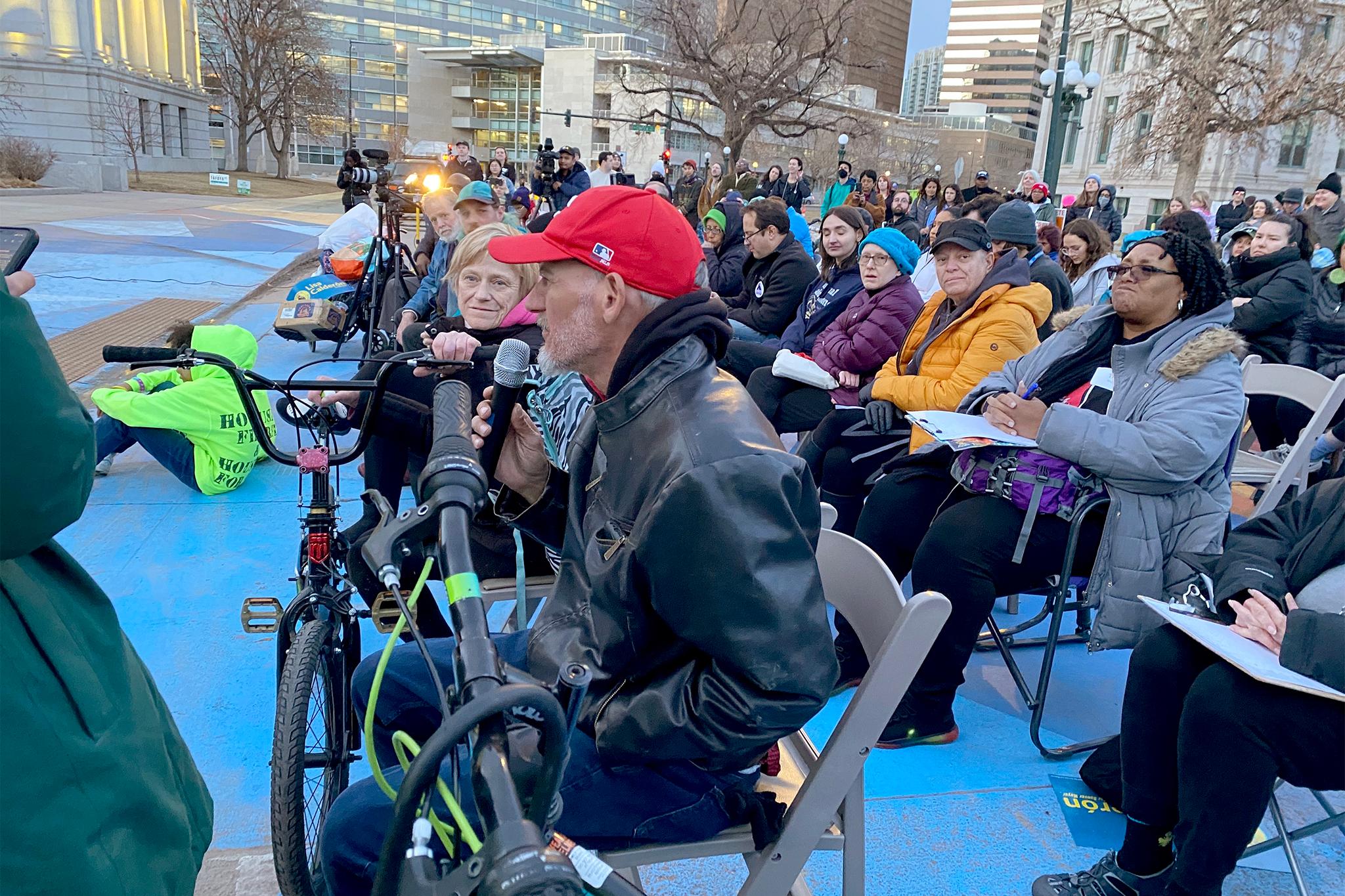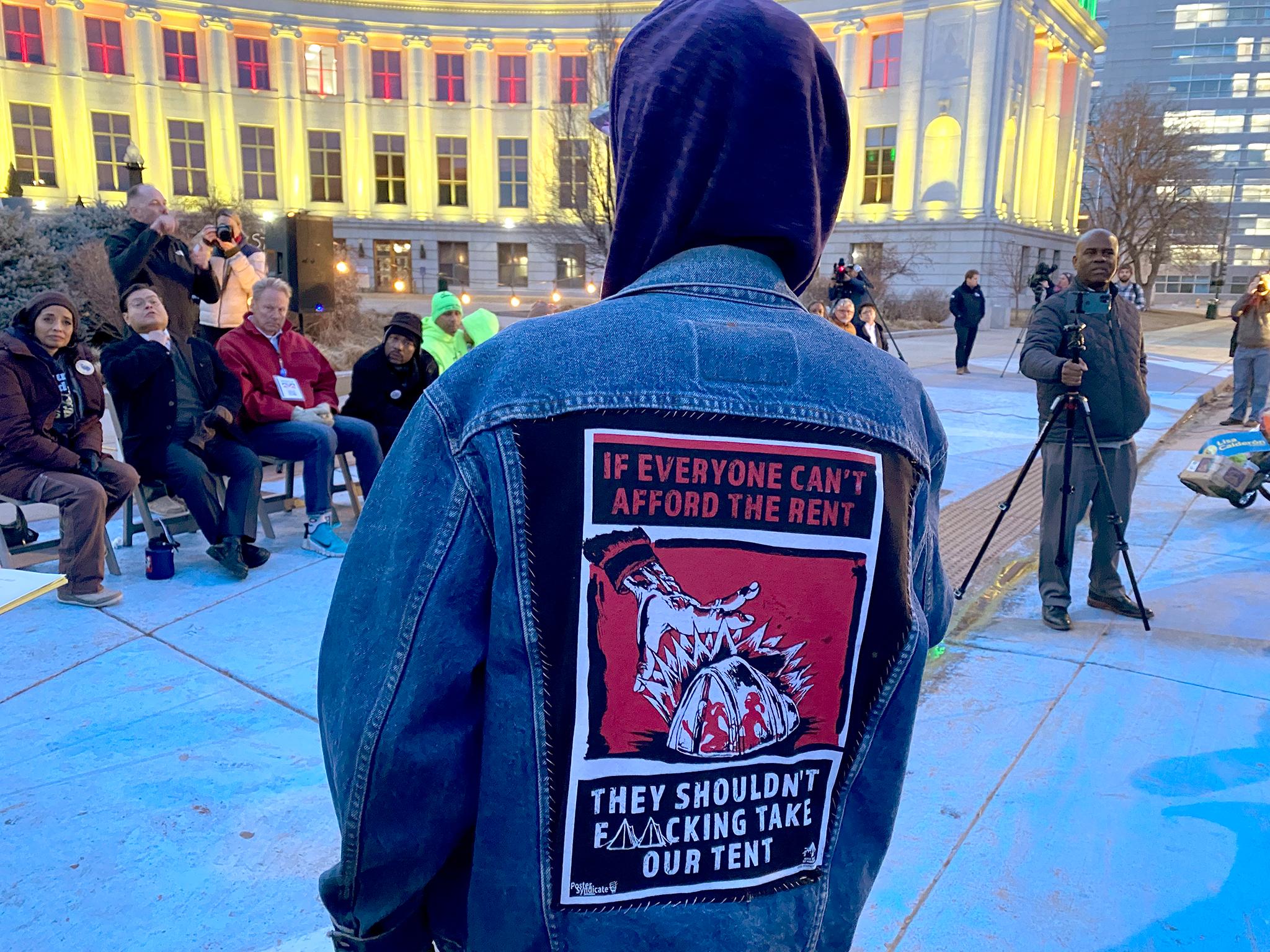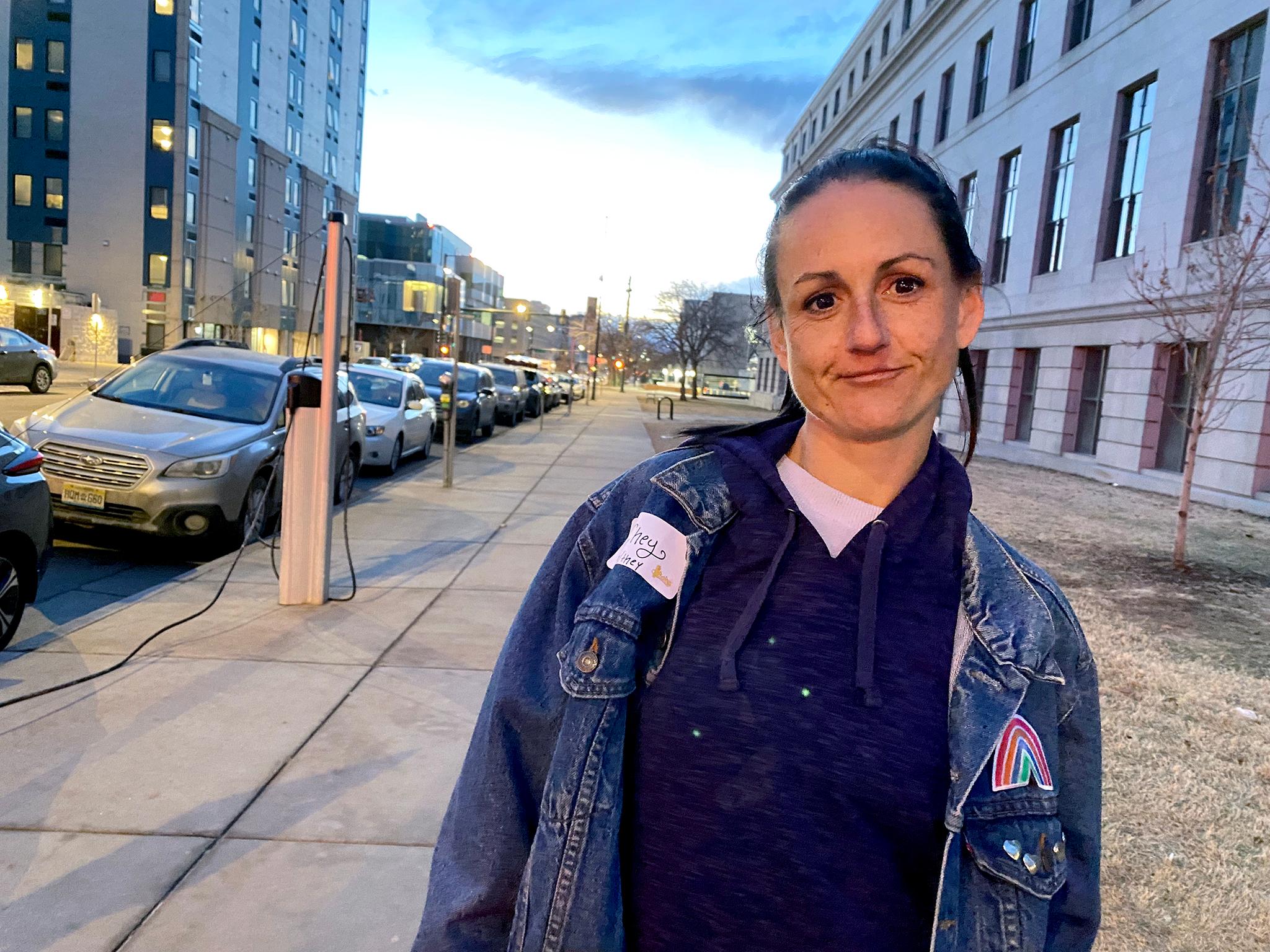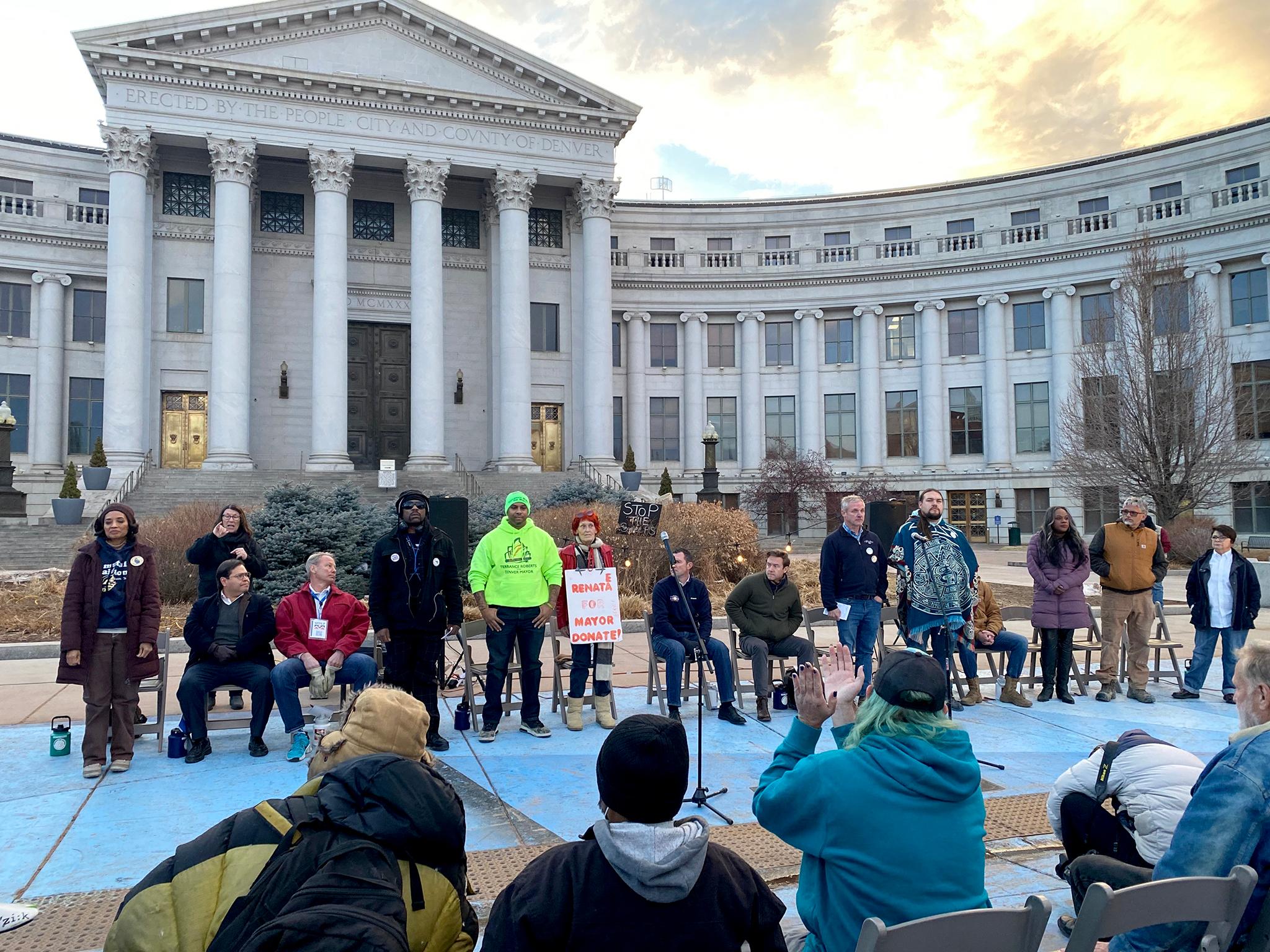Housing and what to do about homelessness have been major issues in the mayoral race.
Candidates have released plans online and through media on addressing the two, but at Monday night's Unhoused Mayoral Candidate Forum, people experiencing homelessness had a chance to question candidates face to face.
The event was hosted by Mutual Aid Monday, a group that has organized a weekly free community meal since 2020.
People experiencing homelessness drafted and asked many of the questions, directed toward Lisa Calderón, Trinidad Rodriguez, Thomas Wolf, Terrance Roberts, Renate Behrens, Chris Hansen, Mike Johnston, James Walsh, Ean Thomas Tafoya, Andy Rougeot, Leslie Herod and Robert Treta.
Denise Maes spoke on behalf of Kelly Brough, who Maes said had plans with her mother and could not attend. Partway through, Tafoya called for write-in candidate Jesse Parris to come from the sidelines and join the other candidates onstage, while Al Gardner, Kwame Spearman, Debbie Ortega and Aurelio Martinez did not attend.
The crowd was a mix of activists, campaign staff, people experiencing homelessness and other community members. And unlike past debates where a lot of back-and-forth took place between candidates on stage, this forum saw audience members unafraid to call out candidates. There were cheers, boos and lots and lots of heckling. Here are the major moments.
People experiencing homelessness raised questions that have not been heard before on the debate stage.
The same few issues continue to circulate among the many mayoral and council debates -- housing, homelessness, public safety, affordability and more. But people asking questions at Mutual Aid Monday wanted more specific answers from candidates.
To name a few: How can people experiencing homelessness find work if they have to get to the shelter by early afternoon to secure a bed? Do candidates support using city funds to pay for treatment programs that Medicaid does not cover? How would candidates fix specific problems at specific shelters? What about the criminalization of fentanyl?
Some questions saw support from all candidates, including increasing funding for case managers, covering treatment left uncovered by Medicaid and auditing city departments and non-profits working with people experiencing homelessness. When answers were more mixed, audience members were not afraid to tell candidates what they thought.

Promises to end sweeps and concrete proposals for housing got resounding cheers from the crowd.
"I am running to stop the inhumane, ineffective, expensive sweeps," Calderón said to loud cheers.
Tafoya received a similar response. "You all know me because I've been out here doing the work trying to turn this around for people, to bring public sanitation, restrooms, food to the people," he said, calling for rent control and overturning the urban camping ban.
Roberts also received cheers for his agenda: social housing and social banking. "We need to scrap this conversation about affordable housing. Affordable for who?" he asked. "Housing is a human right. I don't care about affordable housing. We need public [and] social housing now."
Behrens shared her experience with homelessness following her divorce, which one audience member called "incredible," and Treta received some support for his goal to build housing at $25,000 per person.
The audience also rallied around candidates who called to better listen to people experiencing homelessness themselves.
Audience members cheered and nodded along with Walsh, an academic studying labor movements, who called the race for mayor "upside down." "Everywhere we go we're asked 'What are you going to do about the unhoused?'" he said. "I think the question needs to be turned on its head. What are we going to do about those who profit from an economic system that throws people on the streets?"
Herod echoed Walsh's sentiment that things are upside down. "When we talk about moving people along or sweeping them, sweep folks to where?" she asked. "Have conversations, look folks in the eye. Everyone deserves to be treated with dignity and respect."
Calderón called out competitors for top-down plans to addressing homelessness (without naming names). She's said she's the only candidate to develop her plan around homelessness with those who are actually affected. "You are going to hear from candidates who are going to think that they know what's best for you, but they are going to hear from you loudly and clearly," she said.

And people did share their thoughts loud and clear. Candidates known for supporting sweeps faced boos -- especially Andy Rougeout.
Rougeout already stands out in the race as an openly Republican candidate in a heavily Democrat city. He made his political distinction even clearer Monday night, often taking on contrarian points during the slew of yes-or-no questions. He was the sole candidate to say no when asked if housing is a human right, if Denver should set up a system to evaluate shelters and take action on issues raised by residents and if leaders should work on legislation to house people above the age of 60 and disabled people.
By the time Rougeout took the microphone to explain why he would enforce the urban camping ban, the audience responded with resounding boos, to the extent that most people could not hear what he said. A few people called him racist and an idiot.
The audience also booed Hansen, who has taken a tough on crime approach including enforcing the urban camping ban. At a debate last week, he received pushback from fellow candidates for a campaign ad that included video footage of encampments and people experiencing homelessness, which competitors called offensive for the way it portrayed people of color.

Throughout the constant heckling, people experiencing homelessness made one thing clear: they feel most candidates could never understand their experiences living on the streets.
One audience member said those who wanted to keep the sweeps were "inhumane" -- including Rodriguez, Wolf, Hansen, Johnston and Rougeot. "It doesn't affect you," one audience member called out, while another person asked if the candidates had ever spent a night in a tent.
Chey Kosack asked the candidates about their plan for housing at the forum. "It's been so long I've been locked out of regular typical life," Kosack said afterwards. They said they were drawn to candidates with concrete plans, like Herod's work with the Support Team Assisted Response program and racial justice work, and Treta's goal to build housing on the cheap. "A lot of people are going to talk about it, but they're not going to tell you how they're going to do it," Kosack said.
Aster Clarkson perhaps put it best. After asking a question about drug addiction, Clarkson walked away before hearing any of the answers.
"I don't care about the words, I care about the results," Clarkson said.













